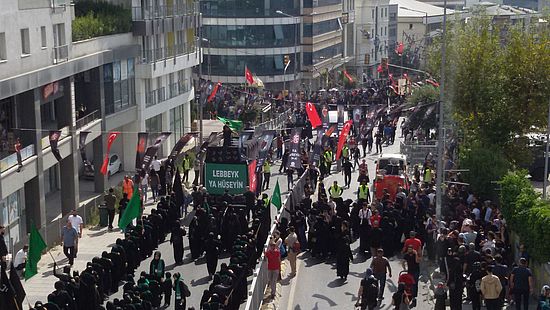
Kerbela at the Bosphorus: Negotiating religious identity among Shii communities in Istanbul
"Ashura processions in Istanbul" (Photo: Sophie Moser, September 2019)
Research project by Sophie Moser
The aim of this research project is to examine Shia communities' memory of the Battle of Kerbela in Istanbul and their self-placement of religious identity in interaction with state and society in Turkey from 1978 onwards. In terms of religious self-view and practice, the battle is of central importance to Shiites throughout the Islamic world, as it was the culmination of the succession struggle for the leadership of the ummah that led to the final secession from the Umayyad caliphate under Yazīd in 680-683.
The battle is commemorated during the first ten days of the month Muḥarram, but its significance for the Shiite culture of remembrance goes far beyond these days. During the Iranian Revolution of 1977-1979, people shouted mā ahl-e kūfa nīstīm - we are not the people of Kufa - at demonstrations to distinguish themselves from the Kufans who did not come to Ḥusain's aid during the battle. The narrative of an ongoing guilt is therefore still evident today. While Ayatollah Khomeini established an Islamic Republic in Iran and thus brought about a stronger self-positioning of Shiites as Shii worldwide, waves of migration from the eastern Anatolian regions of Kars and Iğdır as well as from Azerbaijan, Iran, Iraq and Lebanon led to growing Shii communities in Istanbul. Meanwhile, public ʿĀshūrāʾ processions, Taʿzīyeh performances and speeches in the days from the first to the tenth Muḥarram started. Fringe events such as the distribution of food and drink in the streets also became an important part of the ritual. In the course of this, the Shiites in the Halkalı district formed communities and built the Zeynebiye Camii in 1978-1979, which is still the Shiite centre of Istanbul today. After the mosque was destroyed by the earthquake in 1999, the Shii communities of Istanbul started building a new mosque complex in 2009, which is expected to be completed in the coming years.
The project aims to link historical, philological and ritual-practical research approaches and to investigate the changes to which ritual practice, condensed in the memory of the Battle of Karbala, is subjected by historical circumstances in the national context. To this end, the focus will lay on three essential fields in particular: a) Shii communities as a religious minority in comparison to the Sunni majority society in Istanbul in the historical perspective of the late 20th and 21st centuries, b) linguistic hegemonies and intra-Shiite dynamics over the interpretative sovereignty of the culture of remembrance, c) negotiation processes on religious and national identities, namely in the way that the Turkish and Iranian nation-state concepts each have a strong Sunni and Shii component inscribed in them respectively.
Supervisor: Prof. Dr. Maurus Reinkowski
Funded by: Swiss National Science Foundation (SNSF)
Term: 2021-2025
Quick Links
Social Media
